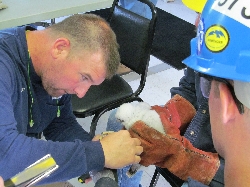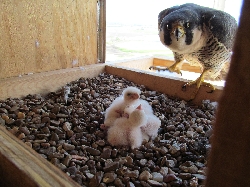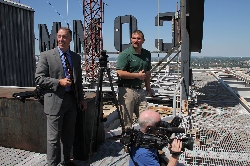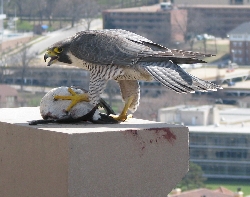University News
Alum, Blandinsville, IL, Native Works to Help Endangered Peregrine Falcon Population in the Midwest
July 9, 2014
MACOMB, IL – Joe DeBold spends his workdays doing many of the things he loved to do as a boy growing up in rural western Illinois. The Blandinsville, IL, native and graduate of Western Illinois University is now an urban wildlife biologist with the Missouri Department of Conservation (MDC). Although his job is based in the urban setting of Kansas City (KC), his work—he's in charge of KC's urban deer management program, as well as serves as the Missouri peregrine falcon recovery leader and a member of the Midwest Peregrine Falcon Coordinators Group—keeps him connected to the natural environment that inspired his career choice.
"I was raised by a father who taught me all about hunting, fishing and trapping from the time I was about five years old," DeBold—who graduated with his bachelor's degree (with a concentration in forestry) from Western's School of Agriculture in 2002 and his master's degree from WIU's biological sciences department in 2006—noted. "That was the number one love in life, and it still is for my father, brother and me. When I was considering a career, I thought, 'I'm going to do something that I love.' Because you hear about people all the time working at jobs they hate. I didn't want to do that."
The Missouri peregrine falcon recovery and tracking group, which DeBold manages across the Show Me state, is part of the Midwest Peregrine Falcon Coordinators Group, based out of the Raptor Center in the University of Minnesota's College of Veterinary Medicine. Last month, DeBold's work with the MDC and the Raptor Center made the front page of the Kansas City Star in Linley Sanders' "Peregrine chicks banded at the Iatan power plant." The article highlighted the work—the banding and tracking of peregrine falcons—that DeBold and his colleagues are doing to help this endangered species in the Midwest recover, decades after DDT exposure greatly reduced their numbers.
"The work with the falcons started long before I was here. It was around 1992 when they started 'hacking' them, which means raising them as chicks and then releasing them into the urban area," DeBold explained. "We use the urban areas not only because it is a biological tool to help with pigeon control, but the urban area also gives the falcons habitat they prefer in which to nest because the prey species are here. If you were to go into a natural area where the falcons are living (for example, out west), you would find their nests on cliff ledges and on big rocky faces. In an urban setting, skyscrapers and smokestacks provide those artificial areas for them to nest."
The Midwest Peregrine Falcon Coordinators Group's work covers a huge swath of the U.S., noted DeBold, including Missouri, Illinois, Iowa, Nebraska, Minnesota, Wisconsin, Indiana and Ohio. In Missouri, DeBold and his colleagues are setting up a geographic information system (GIS) database, which will provide a map of all the artificial nest boxes—such as the one at the Iatan power plant highlighted in the KC Star's story—across the state.
"The GIS database will provide us with a map from St. Louis to Kansas City and all the municipalities in between, as well as any possible natural areas that we know of in Missouri, which are none as of today," he said. "Using the GIS, we can track how many birds we've banded and how many successful nests we have. With these bands, we can tell where our birds are going to, whether they are staying in Missouri or whether they are migrating. Hopefully, we can get them to stay here, where they will have more young. That is what the hope is for us when we start to use this GIS database. Once we get it up and running this year, we will be able to map out Missouri and really tell, for the first time, where we are at exactly in terms of the peregrine falcon population in Missouri."
Media and Mentoring
DeBold, who also played baseball while he attended Western, said the front-page KC Star article that ran in June may be able to be attributed to his regular contact with the media in the metro area, as, for the last seven years he's been with the MDC, he has done many public relations-oriented and media-related interviews.
"I do so many media relations things throughout the year, whether on the local television news stations or in the newspaper outlets we have here. They all know me as the 'urban wildlife guy,' and they know now that when stuff comes up, I'll be sending them an email. For instance, in October, that's the month during which people need to really start looking out for deer on the roadways, because in November, it's their breeding season, and they are everywhere. To help get the word out about the importance of people looking out for deer during those months, I've done remote, early-morning, live feeds with our local TV stations right out along the roadside here," he said. "In this job, you are presenting to people and instructing people all the time in formal presentations, as well as informally. I never had a problem with that, and I think that could stem from being a coach while I was at Western. During that time, I helped coach track and field and baseball at the high school and junior high levels. Also, growing up in athletics, I was the captain of many of the sports teams I played on, so I have always been comfortable in a leadership role."
DeBold said he decided to pursue his undergraduate degree with a concentration in forestry because he wanted to get a grasp of the habitat he knew he would be working with wildlife in someday.
"Instead of going straight into biology, I went into the School of Agriculture's forestry program to learn that part of it, and then I went into biology in order to learn the animal species part of it," he explained. "Along the way, a few professors really helped mentor me, including Andy Baker in the School of Ag, as well as Tom Green, who is retired now, but was the urban forestry professor there when I attended. Dan Sigwart also became instrumental in helping with my direction, and in biological sciences, Richard Anderson, and my adviser, Tom Dunstan, were all mentors for me."
"Student success has always provided me the most satisfaction in my career," said Baker, who now serves as the School of Agriculture director. "All we have to do is empower our students and provide them with the tools necessary to be successful and they will take over from there. Joe has done just that by finding a position that he does not see as work or a job, but as his life's passion. You always love to hear about student success stories like Joe's. I am certain that Joe is 'paying it forward' to his KC constituents, just as we have, as well as his father has to him."
DeBold noted he was Dunstan's last graduate student before Dunstan—who was recognized in National Geographic's 2000 "Eyewitness to the 20th Century" and appeared in two 1975 episodes of Mutual of Omaha's "Wild Kingdom" for his own raptor rescue efforts involving the once endangered American bald eagle—retired from Western in 2004.
"Those professors all really took an interest in me, saw something in me, I think," DeBold said. "I used to talk with them outside of class often, and they would help me with my résumé. I don't think it is a coincidence I was offered the first two jobs I applied for (although I had already accepted the job with the MDC when my first application resulted in a job offer). I think that speaks very highly of Western's programs and what the faculty members at WIU offer their students. I still have personal friendships with all of them today, and that is very special."
For more information about DeBold's work, contact him at (816) 759-7305 or via email at Joseph.DeBold@mdc.mo.gov. Learn more about WIU's School of Agriculture at wiu.edu/ag and the biological sciences department at wiu.edu/biology.
Posted By: Teresa Koltzenburg (WIUNews@wiu.edu)
Office of University Communications & Marketing





Connect with us: